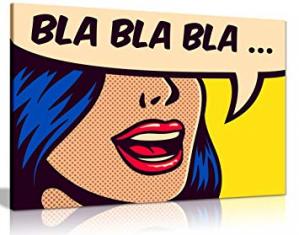

Linguistic suggestion
08/05/2019
Linguistic suggestion
Some left-handers consider themselves to be prejudiced or discriminated against.
Etymology often gives weight to the argument:
In many European languages, "right" is used for authority and justice: German and Dutch, recht; French, droit, Spanish, right-handed; in many Slavic languages the root prav is used in words that carry a sense of "right" or "just". It has been identified to be right-handed with being skilful: right-handed comes from the Latin dexter (as dexterity in English); in truth, the term dexterous in Spanish has both meanings, 'right hand' and 'able'.
Ciotóg is an Irish word used to describe left-handed people, which also means 'strange'.
Meanwhile, the word sinister, derived from Latin, originally 'left', migrated to 'bad' or 'unfortunate', in classical Latin. Sinister comes from sinus, which means 'hollow' or 'pocket'; a traditional Roman toga had only one pocket, placed on the left side for right-handers.
Cucho, it is said in some parts of Spain to the southpaw, and right, to the right. These expressions have a derogatory origin towards left-handers, since cucho is what is called manure or the manure produced with it, or even it is a name that is applied to the pig, while ducho is synonymous with expert or skillful (see dictionary). RAE27).
Lefty is a word of pre-Roman origin, possibly Basque, which does not mean left (ezker). [Citation needed]
Ezker is a Basque patrimonial word from ez-ker. It means in this language 'half a hand'.
Lefty is found in Galician (left handed), Portuguese surro, churro, churdo ('ruin, vile, dirty'), Bearnés: sourrou ('miserly, rude') and Euskera zuhur ('miser, grabbed') and zurrun ( 'inflexible, heavy'). [citation needed]
Maldestre (bad dexterity) in Catalan means clumsy, heavy, annoying.
That is, all the words that mean left-handed start from the idea of "rude" and "clumsy". In a desire for empty and inevolent discrimination, the left-hander is not only considered unfortunate, but also clumsy and clumsy, as shown by the German words for left-handed (links and linkisch, and the adjective link), which mean 'clever' or 'cunning' ', while linken means' betray' or 'cheat'; and the French gauche (the word gacho, also gácho and gachóo, by means of the gypsy ethnic group), derives from gaucher and could be in the origin of gaucho.
As these words are of very old use, everything indicates that the predominance of the right hand is an extremely old phenomenon, as old as the same laterality. In Portuguese, the oldest word to define a lefty, canhoto (pronounced cañoto), was used as a name of the devil, and canhestro (cañestro), a related word, means 'awkward'.
Even the word 'ambidextrous' reflects prejudices. Formed from the Latin ambo and the root dext, 'right-handed': 'two rights'.
One belief suggests that left-handers are more adaptable, intelligent or creative than right-handers: "having a left hand" is a current positive saying in the Spanish language.
Normally, when giving a handshake the right hand is used but the scouts greet each other with the left hand. [Citation needed] When shaking the left hand, the little finger is intertwined with the other scout (this is not always given because in some groups scouts only those that belong to La Tribu (see Totem) are intertwined the little finger). The meaning of this gesture is twofold: We use the left hand, which is the closest to the heart, and we intertwine the little finger as a symbol of brotherhood and union. [Citation needed]
The story of the meaning of this way of greeting refers to: "During the campaign against Prempeh, King of the Ashanti, Baden-Powell captured one of the chiefs." When he surrendered, our Founder extended his right hand in friendship. However, the chief Ashanti insisted on giving him his left hand, explaining that 'only the bravest among the brave ones greet each other with the left hand, because to do so they should be deprived of their greatest protection, which is their shield'. " (Lord Rowallan in "The Boy Scout Movement during the war").
Another interpretation of the greeting refers to the medieval knights who carried the shield with the left hand, that is to say that when greeting with that hand they left aside the shield and "trusted" in the other person. [Citation needed]
Brian Morris in an article published in the "Journal of Contemporary History" (1970) suggests that the origin of the left hand grip adopted by the boy-scouts was another of the ideas that Baden-Powell took from Ernest Thompson Seton and his youth movement of the "Woodcraft Indians". Seton had used this greeting as usual practice in the activities of the Woodcraft Movement and illustrated it in one of his books appeared in 1901 ("The Lives of the Hunted") The greeting with the left hand appears in the writings
Some left-handers consider themselves to be prejudiced or discriminated against.
Etymology often gives weight to the argument:
In many European languages, "right" is used for authority and justice: German and Dutch, recht; French, droit, Spanish, right-handed; in many Slavic languages the root prav is used in words that carry a sense of "right" or "just". It has been identified to be right-handed with being skilful: right-handed comes from the Latin dexter (as dexterity in English); in truth, the term dexterous in Spanish has both meanings, 'right hand' and 'able'.
Ciotóg is an Irish word used to describe left-handed people, which also means 'strange'.
Meanwhile, the word sinister, derived from Latin, originally 'left', migrated to 'bad' or 'unfortunate', in classical Latin. Sinister comes from sinus, which means 'hollow' or 'pocket'; a traditional Roman toga had only one pocket, placed on the left side for right-handers.
Cucho, it is said in some parts of Spain to the southpaw, and right, to the right. These expressions have a derogatory origin towards left-handers, since cucho is what is called manure or the manure produced with it, or even it is a name that is applied to the pig, while ducho is synonymous with expert or skillful (see dictionary). RAE27).
Lefty is a word of pre-Roman origin, possibly Basque, which does not mean left (ezker). [Citation needed]
Ezker is a Basque patrimonial word from ez-ker. It means in this language 'half a hand'.
Lefty is found in Galician (left handed), Portuguese surro, churro, churdo ('ruin, vile, dirty'), Bearnés: sourrou ('miserly, rude') and Euskera zuhur ('miser, grabbed') and zurrun ( 'inflexible, heavy'). [citation needed]
Maldestre (bad dexterity) in Catalan means clumsy, heavy, annoying.
That is, all the words that mean left-handed start from the idea of "rude" and "clumsy". In a desire for empty and inevolent discrimination, the left-hander is not only considered unfortunate, but also clumsy and clumsy, as shown by the German words for left-handed (links and linkisch, and the adjective link), which mean 'clever' or 'cunning' ', while linken means' betray' or 'cheat'; and the French gauche (the word gacho, also gácho and gachóo, by means of the gypsy ethnic group), derives from gaucher and could be in the origin of gaucho.
As these words are of very old use, everything indicates that the predominance of the right hand is an extremely old phenomenon, as old as the same laterality. In Portuguese, the oldest word to define a lefty, canhoto (pronounced cañoto), was used as a name of the devil, and canhestro (cañestro), a related word, means 'awkward'.
Even the word 'ambidextrous' reflects prejudices. Formed from the Latin ambo and the root dext, 'right-handed': 'two rights'.
One belief suggests that left-handers are more adaptable, intelligent or creative than right-handers: "having a left hand" is a current positive saying in the Spanish language.
Normally, when giving a handshake the right hand is used but the scouts greet each other with the left hand. [Citation needed] When shaking the left hand, the little finger is intertwined with the other scout (this is not always given because in some groups scouts only those that belong to La Tribu (see Totem) are intertwined the little finger). The meaning of this gesture is twofold: We use the left hand, which is the closest to the heart, and we intertwine the little finger as a symbol of brotherhood and union. [Citation needed]
The story of the meaning of this way of greeting refers to: "During the campaign against Prempeh, King of the Ashanti, Baden-Powell captured one of the chiefs." When he surrendered, our Founder extended his right hand in friendship. However, the chief Ashanti insisted on giving him his left hand, explaining that 'only the bravest among the brave ones greet each other with the left hand, because to do so they should be deprived of their greatest protection, which is their shield'. " (Lord Rowallan in "The Boy Scout Movement during the war").
Another interpretation of the greeting refers to the medieval knights who carried the shield with the left hand, that is to say that when greeting with that hand they left aside the shield and "trusted" in the other person. [Citation needed]
Brian Morris in an article published in the "Journal of Contemporary History" (1970) suggests that the origin of the left hand grip adopted by the boy-scouts was another of the ideas that Baden-Powell took from Ernest Thompson Seton and his youth movement of the "Woodcraft Indians". Seton had used this greeting as usual practice in the activities of the Woodcraft Movement and illustrated it in one of his books appeared in 1901 ("The Lives of the Hunted") The greeting with the left hand appears in the writings















